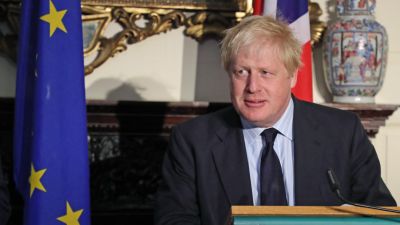Brexit: The reason why Boris Johnson is jeopardising an EU free trade deal

You may wonder why on earth a Tory government led by Boris Johnson, the heirs to Thatcher for goodness sake, are sacrificing the prospect of a trade deal with the EU because they want the right to subsidise British industry.If the Tories and Thatcher stood for anything, it was rolling back the role of the state in the private sector.Well, all that is stuff for the GCSE history syllabus, and turns out to be irrelevant to today's politics.Because if the government of Boris Johnson has an ideology, it is that of Dominic Cummings and his Vote Leave crew. And Cummings's passionate conviction is that Johnson's government MUST have the discretion to invest without fetter in hi-tech, digital, artificial intelligence and the full gamut of the so-called fourth industrial revolution.How so? Well here is the Cummings/Vote Leave fundamental article of faith for this era:"Countries that were late to industrialisation were owned/coerced by those early (to it).
"The same will happen to countries without trillion dollar tech companies over the next 20 years."The whole point of being in government for Cummings - and he would say for his Vote Leave team who work with him in Downing Street - is "to try to change what happens on these questions", I am told.This is a remarkable and important statement.
It won't escape you, if you did an O level or GCSE in history, that the UK was one of those few nations early to the first industrial revolution, which then did indeed own and coerce those that were late.But more importantly, it says that Cummings - and we have to assume his boss Johnson too - are obsessed about not being bossed around by the TWO superpowers that already have trillion dollar tech companies, namely the US and China (and James Forsyth in The Times elaborated on all this in his column on Friday).To be honest, it is moot whether there is any chance for the UK to catch up in this latest industrial revolution with China and America, even if every penny of taxpayers' money was devoted to backing tech innovation. But it certainly matters that this government feels it is an imperative not to be fatalistic and to have a go.All of which is the preamble to explaining why Johnson and his EU negotiator Lord Frost, are happy to blow up talks on a free trade deal with the EU, on the altar of rejecting the EU's insistence that any trade deal must be accompanied by the UK adopting the EU's rules and constraints on subsidising industry, by the UK adopting the EU's state aid regime - or in a worst case following rules that are similar to theirs.Now to be clear, for all Johnson's rhetoric about how the UK could make a tremendous success of trading with the EU without any preferential terms or access, the PM would rather have a deal. And if Johnson stands for anything, it is for opportunistic pragmatism.So maybe he will find a fudge to reassure the EU that his insistence that the UK must have discretion over state aid is not driving a coach and horses through the EU's article of faith that any trade deal must include provisions - such as those on state aid - to prevent unfair competition.Maybe there is a bill he can construct which - in the words of one former EU negotiator - would represent a "serious, reputable, legislated, transparent state aid regime with predictable arms-length governance, where competitor firms can challenge decisions in the way they can challenge EU Commission one".Is there such legislation in planning in sight?Provocatively, almost the opposite is coming down the track.The legislation due to be published by the government in the middle of this week, the Internal Market Bill, is designed to enhance the UK's state aid autonomy rather than constrain it.The background is that Downing Street officials are convinced the EU Withdrawal Agreement, the divorce terms between the UK and EU, contains ambiguous provisions that in and of themselves would shackle Cummings and Johnson and their ambitions to use the resources of the state to invest in the private sector.So the Internal Market Bill has been drafted to clear up those ambiguities in British law, in a unilateral way.But here is why this is so inflammatory: the act of contemplating such unilateral action to amend an international treaty, the EU Withdrawal Agreement, is seen in Brussels and EU capitals as disrespectful, illegal and a wilful attempt to sabotage the free trade negotiations.None of which is to say that there will definitely be no free trade deal, though no deal looks likely.And one final point is very important.To be clear, there would be costs to an economy weakened by Covid-19 of the UK going from its seamless, frictionless trading relationship with the EU's single market to a relationship in January without any kind of mitigating free-trade deal and involving all manner of tax and regulatory friction. That's the view, for example, of the Bank of England, though its senior people have resisted making any public statements to that politically charged effect.There would be a blow to our prosperity.The view of Cummings and Johnson is that such a reduction in the actual and underlying growth of national income represents an investment in a more prosperous future, if that is they acquire what they see as the precious freedom to direct state resources to the sectors and businesses on which our future success will hinge.Who knew that the logic of Brexit would not only be a Thatcherite economic nationalism but a kind of state activism that used to be thought of as socialism?